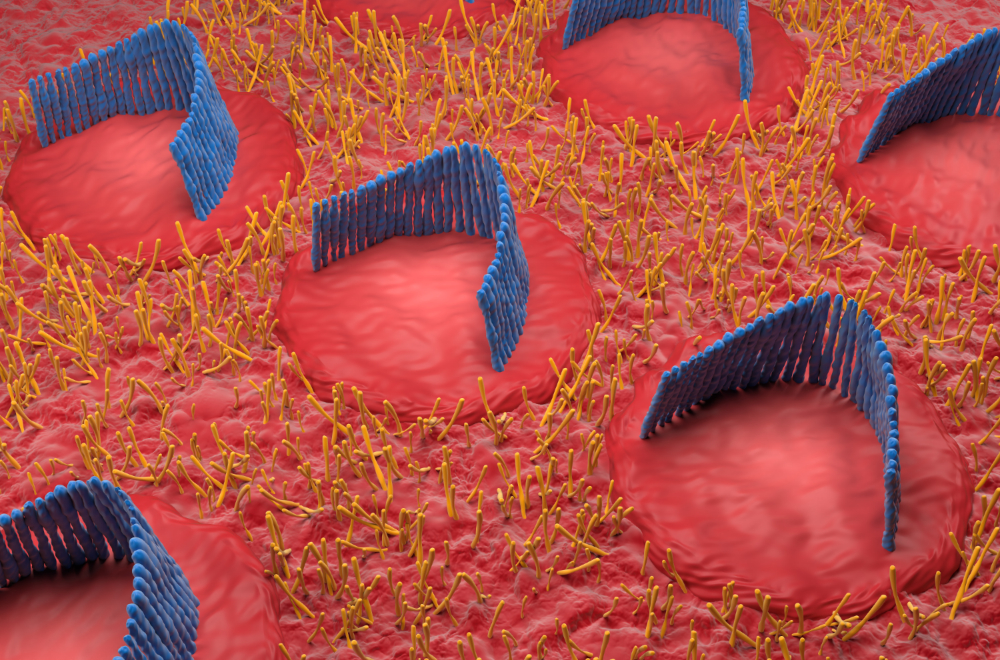- AC102 restores hearing in a preclinical model of sudden hearing loss by protecting inner ear neurons and their neuronal connections
- A Phase 2 clinical study evaluates the efficacy of AC102 in sudden hearing loss patients

Inner hair cells in the inner ear (picture: Nemes Laszlo/Shutterstock.com)
A single application of the novel compound AC102 almost completely restores noise-induced hearing loss in preclinical models. This is the key finding of a recent publication in the prestigious scientific journal PNAS by the Berlin-based start-up AudioCure Pharma. Sudden hearing loss is often treated with anti-inflammatory corticosteroids without regulatory approval or reliable evidence of effectiveness. Therefore, new treatment options are urgently needed for this condition.
Noise-induced hearing loss was used to evaluate the efficacy of AC102 in a preclinical model. A single middle ear application of AC102 after noise trauma restores hearing to near pre-trauma levels after 14 days. In contrast, treatment without the active compound resulted in a profound hearing loss. Further experiments show that AC102 targets the two suspected main causes of sudden hearing loss in the inner ear: It prevents the death of outer hair sensory cells and protects the connections between neurons and the auditory nerve. “It is fascinating how a single molecule has such diverse effects in the inner ear. In laboratory experiments, we see that AC102 protects neurons by increasing their energy production and reducing the production of free radicals. At the same time, it stimulates the regeneration of neurons and sensory cells enabling the reformation of lost connections,” explains Professor Hans Rommelspacher, CSO and founder of AudioCure Pharma.
Sudden hearing loss is a debilitating condition that can severely impair speech understanding and have a negative impact on a patient’s life. Corticosteroids have been used to treat this condition for 50 years, despite lack of approval. Also, their effectiveness has been questioned. Recently, a large study (HODOKORT) showed that more than 60% of patients with sudden hearing loss did not fully recover after corticosteroid treatment. Dr. Reimar Schlingensiepen, CEO of AudioCure Pharma, explains, “The HODOKORT study highlights the treatment gap for sudden hearing loss. We are therefore very excited about the promising effects of AC102 in our preclinical models and hope that patients will also benefit from it.” Following successful safety and tolerability testing, AC102 is currently being evaluated for efficacy in a pan-European Phase 2 clinical study in patients with sudden hearing loss.
About AudioCure
AudioCure is a pioneering clinical-stage pharmaceutical company based in Berlin, Germany. Specializing in hearing disorders with a high unmet medical need, AudioCure has developed a unique proprietary portfolio of small molecules which both protect and restore the delicate inner ear structures affected in otic conditions. After a Phase 1 trial demonstrated the safety and tolerability of their lead compound AC102 in healthy subjects, the compound is currently being investigated in patients with idiopathic SSNHL in a Phase 2 clinical trial. Projects for treatments of tinnitus and to support residual hearing in cochlear implant patients are also in development.
About hearing disorders
Hearing disorders are a global problem. According to the Centers of Disease Control and Prevention (CDC), hearing loss is the third most common chronic physical condition in the United States and twice as prevalent as diabetes or cancer. Moreover, the WHO estimates that approximately 1.5 billion people worldwide suffer from a hearing disorder. This number is expected to rise to 2.5 billion by 2050. Hearing disorders have consequences not only for those affected, but also for their families. In addition to the well-established link between hearing loss and depression, hearing loss is also known to be the number one modifiable risk factor for dementia and cognitive decline. In sudden hearing loss, the hearing impairment occurs very quickly, usually within a few hours or days. Triggers can include a loud bang or by stress, but in most cases the trigger is unknown. Hearing loss is caused by damage to the sensory cells and the connections between the nerve cells in the inner ear. The standard of care for the treatment of SSNHL are corticosteroids but there is only weak evidence for its effectives for this condition. Therefore, to date, no medications have been approved to treat this condition, leaving many patients with permanently impaired hearing.
Downloads:
- Press Release English (PDF): AudioCure_Press-Release_20240401_PNAS
More details on the study:
Contact AudioCure
Frauke Luers